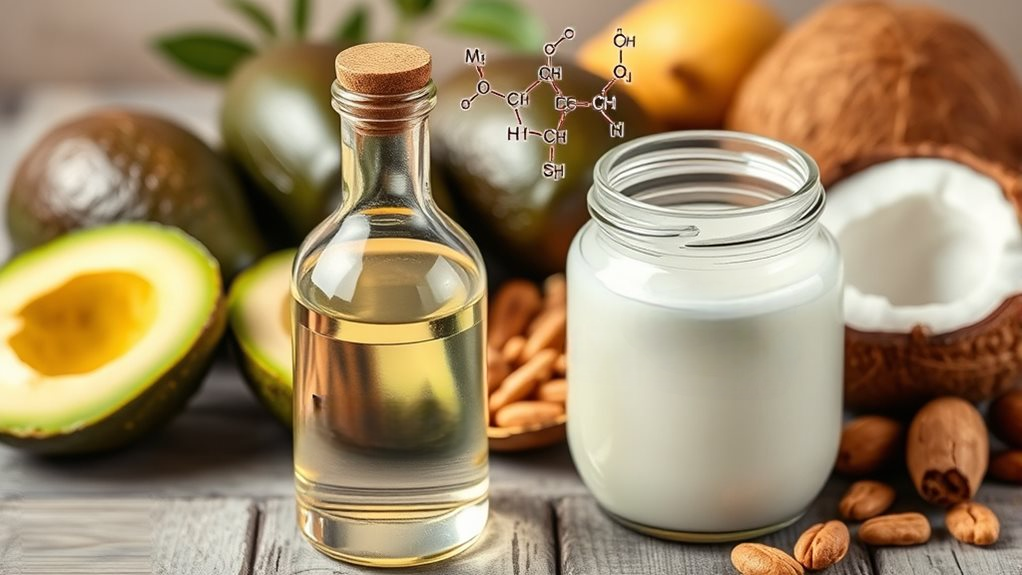MCT Oil vs. Coconut Oil: Which Is Better for Keto?
The Science Behind MCT Oil and Coconut Oil

Both MCT oil and coconut oil contain medium-chain triglycerides, but they're fundamentally different products.
MCT oil is a concentrated extract containing 100% medium-chain triglycerides, primarily caprylic (C8) and capric (C10) acids, which your body converts quickly into ketones.
Coconut oil, while natural, contains only about 54% MCTs, with lauric acid (C12) making up the majority.
Though classified as an MCT, lauric acid behaves more like a long-chain fatty acid in your body, metabolizing more slowly.
This distinction matters for keto dieters because pure MCT oil provides rapid energy and ketone production, while coconut oil offers a more gradual release with additional benefits from other compounds.
Your goals will determine which serves you better.
Nutritional Comparison: MCT vs. Coconut Oil Profiles
A nutritional breakdown reveals stark differences between MCT oil and coconut oil despite their related origins.
While coconut oil contains approximately 54% MCTs, pure MCT oil delivers 100% medium-chain triglycerides, making it more concentrated and potent for ketone production.
Coconut oil's composition includes lauric acid (49%), caprylic acid (8%), capric acid (7%), and other fatty acids.
In contrast, MCT oil typically contains optimized ratios of caprylic (C8) and capric (C10) acids, which convert to ketones more efficiently.
Calorie-wise, both oils provide similar energy (about 120 calories per tablespoon), but MCT oil's rapid absorption means you'll experience faster energy conversion.
If you're strictly counting macros on keto, note that both oils are 100% fat with zero carbs or protein, though MCT oil's specialized fatty acid profile makes it nutritionally superior for ketosis.
Ketone Production Efficiency: Which Oil Performs Better?

When comparing ketogenic efficiency, MCT oil substantially outperforms coconut oil in speed and potency of ketone production. This is because MCT oil contains nearly 100% medium-chain triglycerides that your liver quickly converts to ketones, while coconut oil contains only 54-62% MCTs alongside longer-chain fats requiring more processing.
| Measure | MCT Oil | Coconut Oil |
|---|---|---|
| Time to Ketosis | 30-60 mins | 2-3 hours |
| Ketone Level Increase | 300% | 75-100% |
| Metabolic Pathway | Direct liver conversion | Partial digestion first |
| Energy Boost | Immediate | Gradual |
| Fasting Mimicking | Strong effect | Moderate effect |
You'll experience faster ketone production with MCT oil, making it ideal for quick energy needs and intermittent fasting support during your keto journey.
Weight Loss Benefits on a Keto Diet
Beyond ketone production efficiency, many keto dieters ultimately care about one primary outcome: weight loss. MCT oil offers a distinct advantage here, as studies show it can increase feelings of fullness and reduce caloric intake throughout the day.
When you consume MCT oil, your body processes it rapidly, potentially boosting your metabolism by 5-10%.
Coconut oil still supports weight loss but works more gradually. Its longer-chain fatty acids require more processing by your liver, resulting in slower satiety effects.
However, some research suggests coconut oil may help reduce abdominal fat specifically.
For maximum weight loss on keto, consider using MCT oil before workouts or during morning fasting periods, while saving coconut oil for cooking.
Your weight loss results will likely improve most when you combine either oil with consistent calorie control.
Cooking Applications and Stability in Keto Recipes

The kitchen versatility of these oils creates a significant difference in their keto applications.
Coconut oil shines in high-heat cooking situations, with a smoke point of 350°F (refined varieties reaching 450°F), making it ideal for sautéing, baking, and frying keto-friendly foods. Its solid state at room temperature also provides structure to fat bombs and desserts.
MCT oil, however, has a lower smoke point (320°F), limiting its use in direct heat cooking. You'll find it's best utilized in cold applications like keto coffee, smoothies, and salad dressings.
Unlike coconut oil, MCT oil remains liquid regardless of temperature, making it impractical for recipes requiring solid fats.
For best keto cooking results, keep both oils handy—coconut for heat applications and MCT for no-cook options.
Digestion and Absorption Differences
Perhaps the most notable difference between MCT and coconut oils lies in how your body processes them. MCT oil bypasses normal digestive pathways, traveling directly to your liver where it's rapidly converted into ketones. This provides almost immediate energy without requiring bile or pancreatic enzymes for digestion.
MCT oil requires minimal digestive processing and converts to ketones within minutes, making it ideal for quick energy boosts.
Coconut oil contains 50-65% MCTs but requires more complete digestion before those MCTs become available.
Absorption efficiency is markedly higher with pure MCT oil, which can achieve blood ketone levels 3x faster than coconut oil.
Digestive comfort often favors gradual introduction of MCT oil, as its rapid absorption can cause GI distress when consumed too quickly.
Cost Analysis and Best Uses for Keto Practitioners
While both oils serve important functions in a ketogenic lifestyle, their price points and ideal applications differ considerably. MCT oil typically costs 2-3 times more than coconut oil, reflecting its concentrated nature and specialized processing. This premium is often justified for performance athletes or those seeking rapid ketone production.
You'll get the most value using coconut oil for everyday cooking, baking, and beauty applications where its natural flavor enhances dishes. Reserve your MCT oil for strategic purposes like pre-workout fuel, bulletproof coffee, or when you need quick energy without digestive distress.
For keto beginners, start with coconut oil as your pantry staple, then add MCT oil as your budget allows and specific needs emerge. This approach maximizes both your ketone levels and your wallet's health.
Frequently Asked Questions
Can MCT Oil Cause Digestive Issues for Keto Beginners?
Yes, MCT oil can cause digestive issues when you're new to keto.
Your body needs time to adjust to processing concentrated MCTs, which may lead to stomach cramps, diarrhea, or nausea.
Start with just 1 teaspoon daily and gradually increase your intake.
Taking MCT oil with food rather than on an empty stomach can help reduce these side effects while your digestive system adapts.
Is MCT Oil Safe During Pregnancy While Following Keto?
You should consult your healthcare provider before using MCT oil during pregnancy while following keto.
Pregnancy requires specific nutritional needs, and ketogenic diets themselves remain controversial during pregnancy.
While MCT oil isn't inherently unsafe, dosage, timing, and individual health factors matter greatly.
Start with very small amounts if your doctor approves, watch for digestive discomfort, and prioritize a well-rounded prenatal nutrition plan that your healthcare team supports.
How Long Does MCT Oil Stay Fresh After Opening?
Once opened, your MCT oil typically stays fresh for 1-2 years when stored properly.
Keep it in a cool, dark place away from direct sunlight and heat.
You'll know it's gone bad if it smells rancid or has an off taste.
Refrigeration isn't necessary but can extend shelf life.
Always check the expiration date on your bottle and replace it if you notice any changes in color, smell, or consistency.
Can Children on Therapeutic Keto Diets Use MCT Oil?
Yes, children on therapeutic keto diets can use MCT oil when supervised by healthcare professionals.
It's commonly used for managing epilepsy in pediatric patients. You'll want to start with small amounts and gradually increase to avoid digestive discomfort.
Always consult your child's neurologist or dietitian before adding MCT oil to their regimen, as they'll provide proper dosing guidelines based on your child's specific needs, age, and weight.
Does MCT Oil Interact With Medications Commonly Taken by Keto Dieters?
MCT oil may interact with certain medications.
If you're taking medicines for diabetes, blood pressure, or cholesterol, be cautious as MCT oil could enhance their effects.
It might also affect medications metabolized by your liver.
Always talk to your doctor before combining MCT oil with prescriptions, especially if you're on anticoagulants or medications with narrow therapeutic windows.
Don't make medication changes without professional guidance, even when following a keto diet.
Conclusion
You'll get faster ketosis with MCT oil due to its concentrated medium-chain triglycerides that convert quickly to ketones. Coconut oil works too, but its lauric acid metabolizes slower. Choose MCT oil for immediate energy and enhanced ketone production, especially during your keto changeover. For cooking and everyday use, coconut oil's versatility makes it a worthy staple. Your goals will determine which is right for your keto journey.
